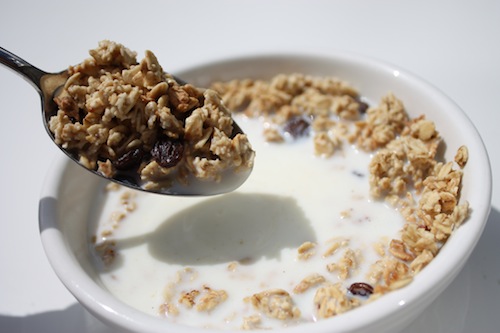Food Myths Debunked (Part 2): Healthy Eating
IS breakfast really the most important meal of the day? Is eating after 9pm bad for you? Victoria Brown gets to the truth behind these healthy eating mantras from dietary expert Janeane Dart.
In this second instalment of Food Myths Debunked, we explore what healthy eating means. Once again, we’re helped by Monash University’s Department of Nutrition and Dietetics senior lecturer Janeane Dart, who says eating healthy is not just about what you eat – but how and when you eat it.
Myth 1: Breakfast is the most important meal of the day
Our verdict: True!
Yes, it’s true – missing out on breakfast is bad for you, and will influence your performance at university.
Ms Dart explains if you don’t have breakfast, your brain and body won’t get the glucose it needs to function. Without that, we won’t have the fuel to perform at our best or brightest.
“Whether that performance is around thinking or walking or whatever, we really need to give our body adequate fuel to begin the day with,” she says.
It’s a good idea to begin the day with something that’s high in fibre and low GI, like cereal. That way you have enough energy to keep you going all the way to lunch time.
Myth 2: Eating after 9pm is bad for you
Our verdict: Half busted!
We’ve all heard this myth before, but in reality, it has nothing to do with what time you eat, and more to do with what you’re eating.
“If your day starts later or if you like to sleep in and begin your day at 11am, you might be having dinner at around 9pm, and that’s absolutely fine,” Ms Dart says.
“But if you’re eating at 6pm, 9pm, 10pm and midnight, it’s likely that you’re packing in way too much food.”
Our bodies don’t have an on/off switch when it comes to hunger. Some people, especially shift workers, consume all their meals when the rest of us are fast asleep. The key is make sure you’re eating because you’re hungry and not because you’re bored or need a distraction from studying.
It is also important to make sure the snacks you’re choosing are healthy snacks. Ms Dart suggests dried fruit and nuts, yoghurt or even a nice, plain milk drink.
Myth 3: Eating 5 small meals a day is better than eating 3 big ones
Our verdict: Busted!
Experiments have shown there’s validity to both arguments, but Ms Dart says neither is better than the other.
It all depends on the individual. No two bodies are the same and no two dietary requirements are the same. Some people may find having three big meals suits them better than having five small meals.
And for those people who are more active, they may find they need regular snacks to help support their performance, so they eat more often.
But overall, it comes back to making sure you’re only eating when you’re hungry. Ms Dart also reminds us to make sure we have a range of nutrients throughout the day by eating plenty of fruits, vegetables and cereals.
Myth 4: Fasting or skipping meals isn’t bad for your health
Our verdict: Busted!
Fasting is bad for your health, and while it’s fine on the rare occasion, like during religious events, it’s not something you should be doing on a regular basis.
Ms Dart says fasting is what messes up our metabolism. So every time you skip a meal or fast, your body will try to reduce your metabolism to conserve energy. Then when you start to eat regularly again, your body will try to speed up your metabolism. In the end, your body will become terribly confused and that’s when you start gaining weight.
If you are trying to lose weight, it’s better to have regular meals that are nutritious and healthy, whether that be three meals a day or even up to five or six smaller meals a day, whatever suits you.
Myth 5: It’s better to eat slow than fast
Our verdict: True!
Ms Dart says in the dietary world, eating slowly compared to quickly is called unmindful versus mindful eating.
“How often have you been sitting in front of the television, eating quickly, and you go ‘Oh my gosh, that was dinner, and I hardly remember what it tasted like?’”
“This is called unmindful eating because we tend to eat very quickly, not chew very well and end up with indigestion,” she says,
Ms Dart says it’s better to be more mindful of your food, and take your time eating. As a guide, some people chew each mouthful around 10 times – conscious way of slowing themselves down.
Another good idea is to enjoy your meals with other people, and switch off any distractions like the television or computer.Really concentrate on the flavours you’re experiencing and give your brain more time to signal that it’s full.
Ms Dart explains it takes around 15 minutes for our brain and our stomach to match up their signals and realise we’re full and satisfied – so it’s far easier to overeat if you’re scarfing everything down in record time.
Check out Part 1 of our Food Myths Debunked series here on the relevance of the food pyramid and the importance of having a balanced diet. And look out for next week’s instalment, where we find out if foods high in carbohydrates cause weight gain.




